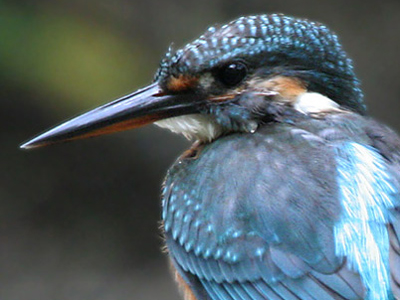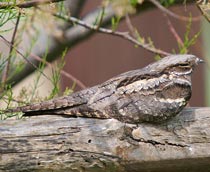
Ask the AI Tutor
Need help with British Birds - Miscellaneous 01? Ask our AI Tutor!
AI Tutor - Lucy
Connecting with Tutor...
Please wait while we establish connection

The flight of this bird is fast, direct and usually low over water. A firm favourite.
British Birds - Miscellaneous 01
Birds (class Aves) are feathered, winged, bipedal, endothermic (warm-blooded), egg-laying, vertebrate animals. Around 10,000 living species makes them the most speciose class of tetrapod vertebrates. They inhabit ecosystems across the globe, from the Arctic to the Antarctic. See if you can recognise the following ten birds in the first of our Miscellaneous quizzes.
1 .
What is the name of this bird?
Common Kingfisher
European Nightjar
Sooty Shearwater
Ring-necked Parakeet
- Group: Shearwaters and Petrels
- Binomial: Puffinus griseus
- Order: Procellariiformes
- Family: Procellariidae
- Status: Passage Migrant
- It makes a huge clockwise migration up the western Atlantic in spring to spend the northern summer there.
- Then in summer/autumn it moves down into UK waters on its return to the southern ocean to breed.
2 .
What is the name of this bird?
Sooty Shearwater
Ring-necked Parakeet
Common Kingfisher
Stone Curlew
- Group: Kingfishers
- Binomial: Alcedo atthis
- Order: Coraciiformes
- Family: Alcedinidae
- Status: Resident Breeding Species
- The flight is fast, direct and usually low over water.
- The short rounded wings whirr rapidly.
- It has no song.
- The flight call is a short sharp whistle, 'chee', repeated two or three times.
3 .
What is the name of this bird?
Whitethroat
Sooty Shearwater
Wren
Stock Dove
- Group: Old World Warblers
- Binomial: Sylvia communis
- Order: Passeriformes
- Family: Sylviidae
- Status: Breeding Summer Visitor
- The song is fast and scratchy, with a scolding tone.
- This is a bird of open country and cultivation, with bushes for nesting.
- The nest is built in low shrub or brambles and 3-7 eggs are laid.
4 .
What is the name of this bird?
Ring-necked Parakeet
Little Egret
Stone Curlew
Stock Dove
- Group: Parrots
- Binomial: Psittacula krameri
- Order: Psittaciformes
- Family: Psittacidae
- Status: Resident Introduced Population
- Often found in flocks, numbering hundreds at a roost site, it can be very noisy.
- Found mainly in south-east England, particularly Surrey, Kent and Sussex.
- Eats fruit, berries, nuts and seeds.
5 .
What is the name of this bird?
Ring-necked Parakeet
Stock Dove
Common Kingfisher
Grey Phalarope
- Group: Sandpipers and allies
- Binomial: Phalaropus fulicaria
- Order: Charadriiformes
- Family: Scolopacidae
- Status: Scarce Winter Visitor
- Once the females lay their olive-brown eggs, they begin their southward migration, leaving the males to incubate the eggs and care for the young.
- The young mainly feed themselves and are able to fly within 18 days of birth.
6 .
What is the name of this bird?
Grey Phalarope
Stone Curlew
Sooty Shearwater
Little Egret
- Group: Bitterns, Herons and Egrets
- Binomial: Egretta garzetta
- Order: Ciconiiformes
- Family: Ardeidae
- Status: Resident Breeding Species And Passage Migrant
- These birds are mostly silent but make various croaking and bubbling calls at their breeding colonies.
- They are listed in the coronation feast of King Henry VI in 1429.
7 .
What is the name of this bird?
Little Egret
Wren
Common Kingfisher
Sooty Shearwater
- Group: Wren
- Binomial: Troglodytes troglodytes
- Order: Passeriformes
- Family: Troglodytidae
- Status: Resident Breeding Species
- Tiny birds that weigh about the same as a £1.00 coin
- Forever twitching and moving around
- Tail sticks out from the body at an oddly twisted angle
- Very loud voice for such a small bird
8 .
What is the name of this bird?
Ring-necked Parakeet
Sooty Shearwater
Common Kingfisher
European Nightjar
- Group: Nightjars
- Binomial: Caprimulgus europaeus
- Order: Caprimulgiformes
- Family: Caprimulgidae
- Status: Breeding Summer Visitor
- A nocturnal bird and can be seen hawking for food at dusk and dawn.
- They have an almost supernatural reputation with their silent flight and their mythical ability to steal milk from goats.
9 .
What is the name of this bird?
Whitethroat
Stock Dove
Stone Curlew
Sooty Shearwater
- Group: Thick-knees
- Binomial: Burhinus oedicnemus
- Order: Charadriiformes
- Family: Burhinidae
- Status: Breeding Summer Visitor
- A strange, rare summer visitor to southern England.
- It is largely nocturnal, particularly when singing its loud wailing songs.
- Its large yellow eyes enable it to locate food when it is dark.
10 .
What is the name of this bird?
Whitethroat
European Nightjar
Stock Dove
Little Egret
- Group: Pigeons and Doves
- Binomial: Columba oenas
- Order: Columbiformes
- Family: Columbidae
- Status: Resident Breeding Species
- It perches well, and in nuptial display walks along a horizontal branch with swelled neck, lowered wings, and fanned tail.
- During the circling spring flight the wings are smartly cracked like a whip.
**Unlimited Quizzes Await You! 🚀**
Hey there, quiz champ! 🌟 You've already tackled today's free questions.
Ready for more?
Ready for more?
🔓 Unlock UNLIMITED Quizzes and challenge yourself every day. But that's
not all...
not all...
🔥 As a Subscriber you can join our thrilling "Daily Streak" against other
quizzers. Try to win a coveted spot on our Hall of Fame Page.
quizzers. Try to win a coveted spot on our Hall of Fame Page.
Don't miss out! Join us now and keep the fun rolling. 🎉
**Unlimited Quizzes Await You! 🚀**
Hey there, quiz champ! 🌟 You've already tackled today's free questions. Ready for more?
🔓 Unlock UNLIMITED Quizzes and challenge yourself every day. But that's not all...
🔥 As a Subscriber you can join our thrilling "Daily Streak" against other quizzers. Try to win a coveted spot on our Hall of Fame Page.
Don't miss out! Join us now and keep the fun rolling. 🎉
















